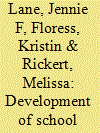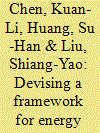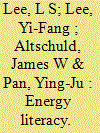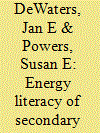|
|
|
Sort Order |
|
|
|
Items / Page
|
|
|
|
|
|
|
| Srl | Item |
| 1 |
ID:
127233


|
|
|
|
|
| Publication |
2014.
|
| Summary/Abstract |
Through a qualitative comparative case study, this investigation examined the process by which three school districts in Wisconsin, U.S.A., developed a school energy policy and complementary energy education plan. To guide the process, the researchers created an outline of recommended steps for the districts to follow. Although there were variations in the sequence and perceived ease of the steps, the Energy Task Force members involved in the process found the outline to be a supportive guide. Further analysis of the cases involved interviewing members of the Energy Task Forces to identify facilitating and obstructing factors. The study concluded that factors such as level of environmental literacy, along with aspects of the school culture and leadership, interacted to influence the successful drafting of school energy policies and education plans. In addition to introducing an outline of recommended steps that can be used by other school policy development teams interested in promoting energy efficiency, this study adds insights into the analysis of energy policy work within the context of a school setting.
|
|
|
|
|
|
|
|
|
|
|
|
|
|
|
|
| 2 |
ID:
119814


|
|
|
|
|
| Publication |
2013.
|
| Summary/Abstract |
Research has indicated that incorporating carbon reduction in the curriculum could improve awareness about energy conservation and related practices. Much research has been conducted on curriculum design and evaluation methods for energy education. However, a comprehensive view of the educational objectives for improving energy literacy is still lacking in these efforts. In this study, we propose a framework for energy education that clearly captures the concept of energy saving and carbon reduction by reviewing related literature and consulting an ad hoc panel of experts on energy and education. We then apply the analytic hierarchy process (AHP) to determine the indicators of the framework and their priority or weights. The results show that the dimensions of "civic responsibility for a sustainable society" and "low-carbon lifestyle" are considered most important as an energy educational goal. Among the indicators, "awareness and self-efficacy" and "identifying carbon-less technology and action plans" are ranked first and second. Application of this framework in K-12 curriculum and relevant educational issues are recommended.
|
|
|
|
|
|
|
|
|
|
|
|
|
|
|
|
| 3 |
ID:
137666


|
|
|
|
|
| Summary/Abstract |
Energy literacy that can empower people to make thoughtful decisions and take responsible actions is more important as energy shortages have become pressing issues in the world. Energy literacy was measured among a sample of 2400 secondary students involved in a national energy education program in Taiwan. Response patterns related to student background and factors determining energy consumption behaviors were also studied. Energy literacy was high and positive, with greater impact as expected by grade (senior high school students outscored junior high school ones) and there were some effects due to gender and socioeconomic status. Students' performance on energy knowledge was acceptable (over 60% correct across grades) while a notable discrepancy between affect and behavior was identified indicating that there might not be a correspondence between what people say they would do and what they actually do. Energy saving behavior was more closely associated with the affect than other variables. Reasons for the findings and implications for energy education in the future are discussed.
|
|
|
|
|
|
|
|
|
|
|
|
|
|
|
|
| 4 |
ID:
103473


|
|
|
|
|
| Publication |
2011.
|
| Summary/Abstract |
Energy literacy, which encompasses broad content knowledge as well as affective and behavioral characteristics, will empower people to make appropriate energy-related choices and embrace changes in the way we harness and consume energy. Energy literacy was measured with a written questionnaire completed by 3708 secondary students in New York State, USA. Results indicate that students are concerned about energy problems (affective subscale mean 73% of the maximum attainable score), yet relatively low cognitive (42% correct) and behavioral (65% of the maximum) scores suggest that students may lack the knowledge and skills they need to effectively contribute toward solutions. High school (HS) students scored significantly better than middle school (MS) students on the cognitive subscale; gains were greatest on topics included in NY State educational standards, and less on topics related to "practical" energy knowledge such as ways to save energy. Despite knowledge gains, there was a significant drop in energy conservation behavior between the MS and HS students. Intercorrelations between groups of questions indicate energy-related behaviors are more strongly related to affect than to knowledge. These findings underscore the need for education that improves energy literacy by impacting student attitudes, values and behaviors, as well as broad content knowledge.
|
|
|
|
|
|
|
|
|
|
|
|
|
|
|
|
| 5 |
ID:
127263


|
|
Factors influencing perceptions of domestic energy information: content, source and process
/ Simcock, Neil; MacGregor, Sherilyn; Catney, Philip; Dobson, Andrew, Ormerod, Mark, Robinson, Zoe Ross, Simon Royston, Sarah Hall, Sarah Marie
|

|
|
|
|
| Publication |
2014.
|
| Summary/Abstract |
Reducing household energy consumption is an essential element of the UK Government's carbon reduction strategy. Whilst increased knowledge alone will not necessarily lead to tangible actions on the part of consumers, knowledge of various kinds is, we argue, still important if domestic energy usage is to be reduced. In an attempt to 'educate' the public, governments have typically resorted to 'mass information' campaigns that have been considered largely unsuccessful. Yet understanding what alternative forms of learning could be cultivated has been limited by the dearth of research that explores whether and why people consider information about energy and energy saving to be useful. By exploring this, we can move towards an understanding of how knowledge about energy saving can be better shared and communicated, enabling more meaningful learning to take place. Drawing on in-depth qualitative data with fifty-five participants, this paper highlights a range of factors that affect perceptions of energy information. It argues that these factors are not discrete, but are interlinked. A fundamentally different model of knowledge exchange is needed for more effective learning about energy saving to occur. A number of implications for policy are proposed in our conclusions.
|
|
|
|
|
|
|
|
|
|
|
|
|
|
|
|
|
|
|
|
|